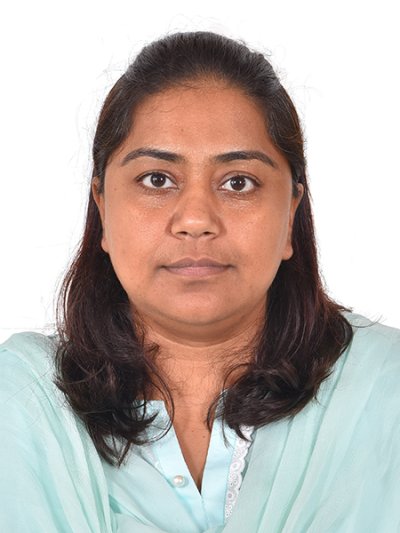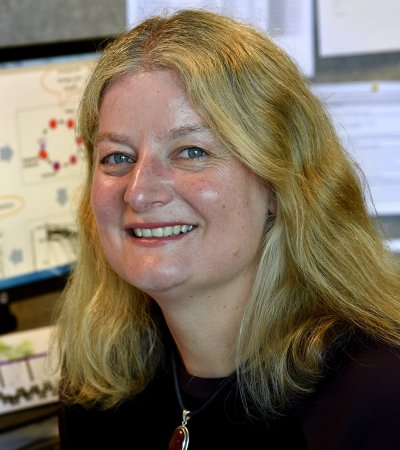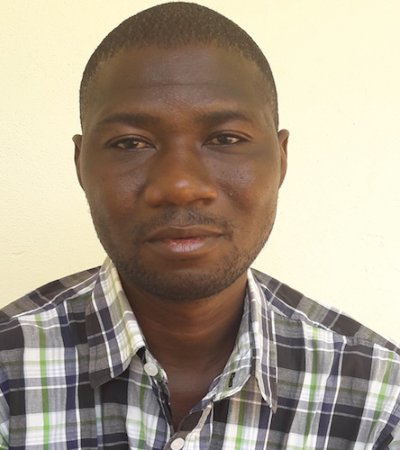
Dr Najia Ghanchi's research interest includes diagnostics, antimalarial drug resistance, P. vivax epidemiology, clinical drug trials with additional interest in emerging infections and Pathogen genomics.
Currently, Dr Najia is conducting studies to evaluate radical cure strategies for Plasmodium vivax, drug resistance in malaria parasites, and evaluating new diagnostic assays. Her current projects are evaluating rapid diagnostic tests for malaria case detection as well as diagnostic tests that enable safe radical cure of P. vivax malaria such as point-of-care tests for glucose-6-phosphate dehydrogenase (G6PD) deficiency.
She has an extensive expertise in molecular biology, focusing on the identification and understanding of the genetic characteristics of pathogens and integrating this knowledge into clinical diagnostics.

Jennifer is a Professor in applied mathematics in the School of Mathematics and Statistics at the University of Melbourne. Her research focuses on using mathematics and statistics to answer questions in biology and medicine. In particular, she develops mathematical models in areas such as wound healing, tumour growth and infectious disease epidemiology. Jennifer was awarded a PhD in 2009 from Queensland University of Technology on “Mathematical modelling of chronic wound healing”.
From 2010 – 2013, she was at the University of Oxford developing mathematical models for the spread of resistance to antimalarial drugs. From 2014 – April 2017 Jennifer was a Lecturer in the School of Mathematical Sciences at Monash University. In 2016 she started an ARC Discovery Early Career Research Award to study and mathematically model venous leg ulcers. In May 2017, Jennifer joined the School of Mathematics and Statistics at the University of Melbourne as a Senior Lecturer in Applied Mathematics. She was promoted to Associate Professor in 2020 and Professor in 2023.

Professor Daniel Ansong is a Professor of Paediatrics and Child Health. He is a former Dean of the School of Medical Sciences, at the Kwame Nkrumah University of Science and Technology (KNUST), Kumasi Ghana. His research focus is on severe malaria in children and vaccine research. He has co-led pivotal Phases II and III clinical trials and contributed to the WHO-sponsored RTS,S Malaria Vaccine Implementation Programme in Ghana.
Daniel has over two decades of experience in severe malaria clinical research. He has contributed immensely to building research capacity in Ghana. He played pivotal roles in the Severe Malaria in African Children (SMAC) consortium and the Artesunate versus Quinine in the treatment of Severe Falciparum Malaria in African children (AQUAMAT) Trial. Currently, he is the Ghana site Principal Investigator for the Severe Malaria a Research and Trials (SMAART) consortium.

Elizabeth is a statistician and researcher. For the last 15 years she has been working on clinical trials in the area of acutely sick children presenting to hospitals in Africa. These have included trials looking at fluid resuscitation for paediatric shock, blood transfusion volumes for severe anaemia, antibiotics and other adjunctive therapies for severe malaria and bacterial coinfection, and fluids for children with gastroenteritis with or without severe malnutrition.
Elizabeth is a co-investigator for a research consortium on research and trials for severe malaria in Africa. She is passionate about conducting high quality clinical trials, and adding that data, and data from observational studies together through evidence synthesis and data re-use. This enables us to answer key questions and provide evidence for guidelines in treatment of children when they present to hospital in Africa with severe malaria and other infectious diseases.

Stephanie Dellicour is a pharmacoepidemiologist. She obtained an MSc in Epidemiology from the London School of Hygiene and Tropical Medicine and her PhD in Epidemiology from the University of Amsterdam. Stephanie conducted her dissertation research on the development of pharmacovigilance surveillance systems for antimalarial drugs used in pregnancy. She was based in western Kenya for four years as a visiting scientist with the KEMRI/CDC research station, where she implemented and oversaw a range of studies for the Malaria in Pregnancy Consortium.
She is currently seconded by the Medicines and Healthcare products Regulatory Agency (MHRA) to lead the MiMBa Pregnancy Registry. This is a collaboration between the Medicines for Malaria Venture, the Liverpool School of Tropical Medicines and WWARN, which aims to generate robust data on the safety of a range of antimalarials, particularly in the 1st trimester, to inform regulators and policymakers.
Her main research interests include pharmacoepidemiology, pharmacovigilance, with a focus on pregnant women.

Professor Julie Simpson is a NHMRC Senior Research Fellow, Head of Biostatistics and Deputy Head of the Melbourne School of Population and Global Health, The University of Melbourne, and chief investigator of the Australian NHMRC Centre of Research Excellence for Malaria Elimination.
Julie has 25 years of experience working in biostatistics teaching and research positions, and has led and collaborated on many research projects (laboratory, clinical trials and large-scale population studies), illustrating her broad knowledge of study design and statistical methodology.
Her primary area of research is the bridging of novel statistical and mathematical modelling approaches to inform treatment policy for malaria and she has been an advisor to the World Health Organization, Medicines for Malaria Venture and the WorldWide Antimalarial Resistance Network regarding dosing regimens for current and new antimalarial drugs. Her research has generated evidence that has led to revised dosing recommendations for antimalarial regimens and improved sampling designs for antimalarial pharmacokinetic-pharmacodynamic studies.
Her other main research interest is the application of complex statistical methods to answer important public health questions in longitudinal observational cohorts, in particular, the implementation of multiple imputation for handling missing data.

Dr Martin Walker leads the schistosomiasis and soil-transmitted helminth research theme, a collaborative global forum for sharing and analysing data to improve treatment outcomes for these neglected poverty-related diseases.
Martin is a Lecturer and Assistant Professor in Epidemiology at the Royal Veterinary College, University of London and an Honorary Lecturer at Imperial College London. His core research interests lie in big data analytics and mathematical modelling applied to the treatment, control and elimination of parasitic infectious diseases. Martin previously led the ‘QuoVadis’ project (World Health Organization), improving methods for monitoring and evaluating responses to the drugs used for Preventative Chemotherapy of human helminthiases.

Maria-Gloria Basáñez is a Professor of Neglected Tropical Diseases at Imperial College London. Maria-Gloria did her MSc in Medical Entomology and Applied Parasitology at the Liverpool School of Tropical Medicine with Sandy Trees and her PhD in Mathematical Epidemiology at Imperial College London with Roy Anderson. Her teaching and research at the Department of Infectious Disease Epidemiology (School of Public Health) of Imperial College has focused on the population biology and transmission dynamics of neglected tropical diseases (NTDs) and vector-borne infections. She has published on trachoma, intestinal nematode infections, malaria, Chagas disease, schistosomiasis and filarial parasites.
Under the umbrella of the NTD Modelling Consortium and the London Centre for Neglected Tropical Disease Research, her research group is currently developing, refining and comparing mathematical models of River Blindness to support ongoing control and elimination efforts. Maria-Gloria has served in the Mectizan Expert Committee of the Mectizan Donation Programme, the Programme Coordinating Committee of the Onchocerciasis Elimination Programme for the Americas, the Disease Reference Group on Human Helminthiases of the World Health Organization/TDR, and the Global Burden of Disease 2010 Study. She is the current President of the British Society for Parasitology. She has published more than 150 papers ranging from entomological and parasitological studies to dynamic and statistical modelling of tropical diseases and has been a member of the Editorial/Advisory Board of Parasitology, International Journal for Parasitology, Trends in Parasitology, Advances in Parasitology and Parasites & Vectors.
Together with Roy Anderson, Maria-Gloria has edited two volumes on “Mathematical Models for Neglected Tropical Diseases: Essential Tools for Control and Elimination, Parts A and B”, published by Advances in Parasitology, respectively in 2015 and 2016 (see reviews here).

Paul joined IDDO in January 2018 as an EDCTP/TDR fellow from the Clinical Research Unit of Nanora in Burkina Faso. He trained as a molecular parasitologist and is interested in Malaria and other parasitic infectious diseases. Over the past five years, his research focusses on assessing the efficacy of antimalarial drugs, studying the genetic diversity of Plasmodium falciparum and exploring the molecular markers associated with antimalarial drug resistance. Dr Sondo continues to collaborate with IDDO/WWARN, and is currently the co-lead of WWARN's Malaria Chemoprevention research theme.

Prof Karen Barnes, based at the University of Cape Town in South Africa, has served as the Head of the Pharmacology Group in WWARN since 2009. Karen has twenty years of experience in clinical pharmacology and pharmacokinetics. Appointed Professor of Clinical Pharmacology at the University of Cape Town in 2008, Karen has more than 70 peer-reviewed publications in malaria. Her main research interests includes the comprehensive evaluation of malaria treatment policy changes in Southern Africa and improving anti-malarial dosing regimens for vulnerable populations. Karen serves as an advisor to several WHO Expert Groups on malaria.